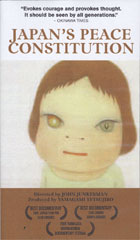
Japan’s Peace Constitution 2005
Distributed by First Run/Icarus Films, 32 Court St., 21st Floor, Brooklyn, NY 11201; 800-876-1710
Produced by Yamagami Tetsujiro
Directed by John Junkerman
VHS, color, 78 min.
Jr. High - Adult
Asian Studies, History, Political Science, World War II, Human Rights
Date Entered: 05/01/2006
Reviewed by Paul Moeller, University of Colorado at BoulderThis documentary reviews the creation of Japan’s post-World War II constitution and discusses the ongoing efforts that are underway to change it. This constitution was largely written by American occupation forces and it included in its Article 9 a statement prohibiting the government from waging war. Almost as soon as it was approved the American government began pushing for a change in Article 9 as the cold war had begun, the communist had formed the People’s Republic of China, the Korean War had broken out, and the Americans had come to believe that an armed Japan could be helpful as a counterbalance to communist power in Asia. The Japanese people resisted this change to Article 9, however, embracing the way the constitution expressed their desire to not be a militaristic nation and supporting the constitution as a model of how a nation could peacefully coexist with the rest of the world. Japan’s Peace Constitution focuses on efforts to revise Article 9 in ways that would allow Japanese Self Defense forces to be sent to Iraq.
With a series of interviews interspersed with documentary film footage, director John Junkerman introduces the debate over the proposed changes and discusses how the changes may affect Japan’s relationship with its neighbors in Asia, the United States, and the people of the Middle East. Included in the discussion are the war crimes committed by Japan in Asia, the continuing efforts of the Korean comfort women to garner apologies and compensation for their mistreatment during the war years, and the debate taking place within Japan.
The quality of the interviews featured in Japan’s Peace Constitution is the strength of this film. John Dower, a Pulitzer Prize-winning historian; Beate Sirtoa Gordon, drafter of the equal-right clause of the Constitution; Chalmers Johnson, a political scientist; and social critic Noam Chomsky are among those who contribute to this film.
Director John Junkerman does a good job of describing the creation of the peace constitution and places the issues involved with the proposed changes within the context of global events. This film should serve well as a discussion tool and will be of value to those interested in modern East Asian politics and history; in peace and war issues; and Japanese society. It is recommended for viewers from Jr High through adult and to those libraries that serve them.
Awards
- Best Documentary, 2005 Japan Film Pen Club Awards
- Best Documentary, 2005 Cinema Jumpo Awards